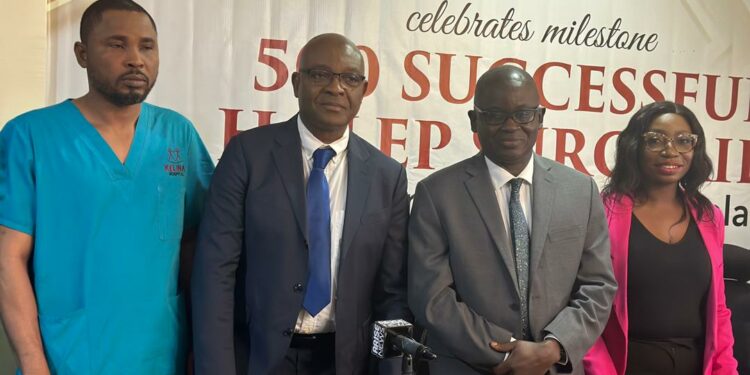Prostate cancer is one of the most common cancers affecting men globally, with African men facing a disproportionate burden of the disease.
In Nigeria, prostate cancer has emerged as a leading cause of cancer-related morbidity and mortality among men, particularly those over the age of 50. Although exact nationwide statistics are limited due to the absence of population-based cancer registries, studies consistently identify prostate cancer as the most frequently diagnosed male cancer in the country.
Available studies estimate the incidence rate of prostate cancer in Nigeria at around 32 per 100,000 men, with a mortality rate of approximately 16 per 100,000. They are not population-based studies, but they are enough to show that Africans are at a higher risk.
A significant factor in this higher prevalence is genetic susceptibility, robotic surgeon, Dr. Bertin Njinou, told LEADERSHIP, adding that, “It is mostly common with black people because of genes.”
In addition to genetics, lifestyle and environmental factors play a key role in prostate cancer risk. Diets high in fat and low in fruits and vegetables are associated with increased risk. Obesity has also been identified as a contributing factor. “Obesity is another risk factor. Reduce fat and adopt a healthy diet,” Njinou advises, while recommending the inclusion of cancer-preventive foods such as broccoli, garlic, green tea, and tomatoes in the daily diet.
Despite the growing awareness, late presentation remains a major challenge in Nigeria. Many patients only seek medical attention when symptoms become severe, by which time the disease may have already spread. This delay in seeking care can be attributed to poor health-seeking behavior, stigma around male reproductive health, and limited access to screening facilities
Early detection remains the most effective tool for improving prostate cancer outcomes, Njinou averred, even as he strongly advocated for regular screening, especially among high-risk populations.
The Prostate-Specific Antigen (PSA) blood test, though not definitive, is a useful and accessible screening method that can prompt further evaluation, Njinou stated, adding that, “PSA testing is a simple blood test, and it can prevent the worst outcomes if started early. For men with a family history of prostate cancer, screening should begin at age 40. For others, age 50 is generally recommended as the starting point.”
In more advanced cases, treatment decisions may involve addressing the role of testosterone in cancer growth. “Prostate cancer depends on testosterone for growth, so in advanced cases, the testes are removed. However, this measure is only taken when the cancer has spread significantly. With early diagnosis, less invasive treatments are available, preserving patients’ quality of life,” Njinou affirmed.
Ultimately, reducing the burden of prostate cancer in Nigeria depends on a combination of education, accessible screening, a proactive healthcare-seeking culture and investment in healthcare infrastructure, among others, consultant urologist Dr. Celsus Undie, noted in an interview with LEADERSHIP.
Recall that in the first nine months of 2024, Nigerians spent approximately $2.39 million (N3.7 billion) on foreign healthcare-related services, including medical tourism.
In recent years however, significant strides have been made in prostate cancer treatment in Nigeria. For instance, Kelina Hospital, based in Abuja and Lagos, has emerged as a leader in minimally invasive prostate procedures, helping to reduce the need for patients to seek treatment abroad. With a focus on advanced technology and evidence-based practices, the hospital is addressing long-standing gaps in local cancer care.
Kelina Hospital was the first facility in Nigeria to perform Laparoscopic Radical Prostatectomy in 2012, and later pioneered Holmium Laser Enucleation of the Prostate (HoLEP), a less invasive procedure for benign prostatic hyperplasia. As of April 2025, the hospital has performed over 6,000 surgeries since its establishment, including 500 HoLEP surgeries and 54 prostate cancer surgeries in 2024 alone.
Looking ahead, Undie said the hospital is introducing Robot-Assisted Radical Prostatectomy (RARP) using a cost-effective Chinese robotic system. “This will allow remote collaboration with international surgeons and improve surgical precision, recovery times, and outcomes. Importantly, Kelina’s efforts are grounded in safety. A patient cannot just walk in and request surgery without proper preparation. We don’t take risks,” Undie affirmed.
Kelina is also playing a role in reducing Nigeria’s dependence on foreign healthcare, the consultant urologist said, adding that, “Many patients now choose Kelina over traveling abroad, citing shorter wait times, lower costs, and comparable outcomes. The hospital’s emphasis on training, partnerships with global experts, and commitment to local capacity-building supports the broader goal of reversing medical tourism in Nigeria.”



